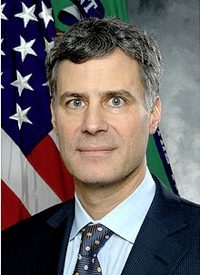
Next week President Obama will roll out his strategic jobs growth plan in a major speech, and has announced that his new chairman of his Council of Economic Advisers, Alan Krueger (left), is just the man to help him with it. Krueger comes from the same mold as the man he is replacing, Austan Goolsbee. Goolsbee graduated from Yale, Krueger from Cornell. Goolsbee got his PhD from MIT, Krueger got his from Harvard. Goolsbee worked for the National Bureau of Economic Research, and so did Krueger. Goolsbee is returning to the University of Chicago, while Krueger is leaving Princeton to join Obama.
But the president insists that Krueger will bring him “unvarnished economic guidance…[which is] more important than ever right now. We need folks in Washington to make decisions based on what’s best for the country, not what’s best for any political party or special interest.”
Goolsbee was brought in with unemployment above 9% and the mandate to improve employment in the housing and manufacturing sectors. Unemployment is still above 9% and employment in the housing and manufacturing sectors is little changed. So rather than change policies, the White House is changing suits.
The challenges facing President Obama have ratcheted up considerably in the past year, and he is now trying to come up with additional strategies and programs to accomplish what Goolsbee couldn’t. He has dropped hints about some of those strategies, including:
• An extension of the payroll tax beyond the end of the year
• Continue and possibly expand jobless benefits
• Pay subsidies directly to businesses who hire
• Infuse government money directly into construction projects
• Pay for all of this through future unnamed spending cuts
Krueger might be just the man for the job. After teaching at Princeton for the last 20 years, he was called to Washington by the president in March of 2009 to be his Assistant Secretary of the Treasury under Timothy Geithner. He left after a year and half to return to Princeton to qualify for tenure, but not before offering a program designed to jump-start the economy: Cash for Clunkers. All that program did was move forward some purchases to take advantage of the credit which wound up stealing sales from the future. When all was said and done, automobile manufacturers enjoyed a brief bump-up in sales, and then a sharp decline after the program ended. There was no lasting economic benefit, just more proof that government interventions, even by smart people like Goolsbee, don’t work. According to a study of the program by researchers at the University of Delaware, each vehicle traded in under the program cost the government $2,000, with total costs of the program exceeding benefits by $1.4 billion.
Krueger isn’t expected to get in the way of Obama’s recommendations, especially the extension of unemployment benefits, even though his own study of the matter indicates that all unemployment benefits do is keep people unemployed longer. But Krueger, as the new suit in town, isn’t likely to cross the president, or even his press secretary, Jay Carney, who explained the Keynesian rationale behind Obama’s planned extension of unemployment benefits:
Extending unemployment benefits] is one of the most direct ways to infuse money into the economy because people who are unemployed and obviously aren’t earning a paycheck are going to spend the money that they get. They’re not going to save it; they’re going to spend it. And unemployment insurance, that money goes directly back into the economy dollar for dollar virtually.
So it is — and when it goes back in the economy, it means that everywhere that those people — everyplace that that money is spent has added business. And that creates growth and income for businesses that then lead them to making decisions about jobs — more hiring.
This half-baked explanation reflects the kind of thinking directing economic policy in the present administration. It looks only at what is seen, and doesn’t consider what isn’t seen. Forget for the moment that the government has no money of its own – only what it forcefully takes from its rightful owners – there is no stimulus here. Money that is removed from the hands who earned that is transferred to those who didn’t reduces the incentive of those who earned it and increases the incentive of those receiving it to clamor for more. Living on the dole takes a lot less effort than working. And thus the whole process slows the economy down.
A Heritage Foundation study proved the point. Unemployment insurance “actually leads to longer periods of unemployment and does not provide the promised stimulative effect.” In fact, the study shows that when unemployment benefits were extended beyond 13 weeks, the average worker remained unemployed two weeks longer than those not receiving the benefits.
The Washington Post made it clear that Obama’s changing suits just before his big speech isn’t going to change anything: “Krueger is a center-left economist in the mold of many top economic policymakers in the Obama administration, including Goolsbee and Harvard economist Lawrence Summers…who resigned as director of [Obama’s] National Economic Council at the start of the year.” Another Harvard economist who headed up George W. Bush’s Council of Economic Advisers, Gregory Kankiw, agreed. Krueger’s appointment is “not a signal that they’re going to change things. It’s a signal of continuity, if anything.”
Related article: Obama Picks Krueger as Economic Council Chairman



